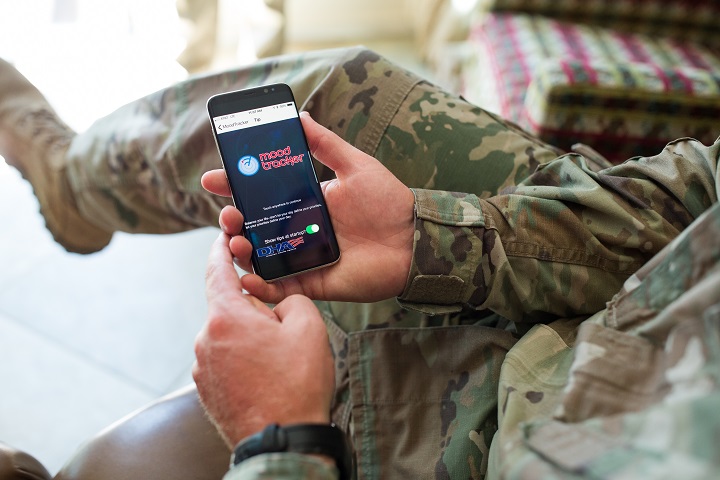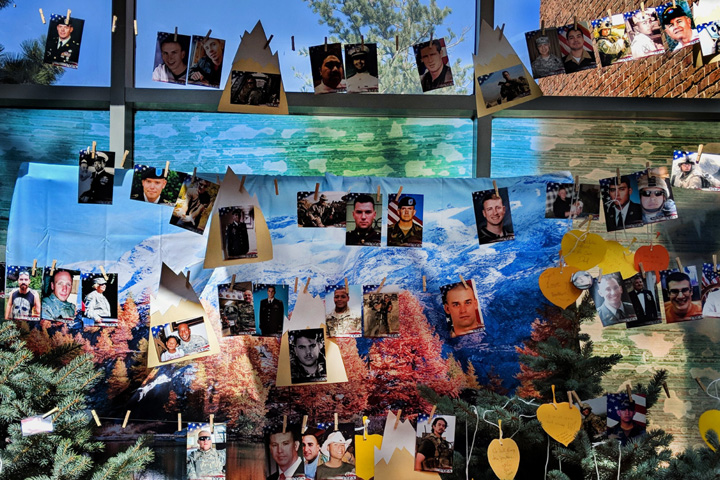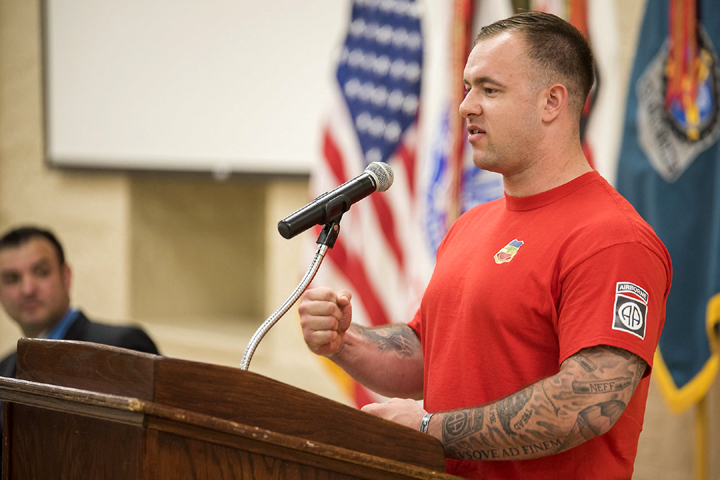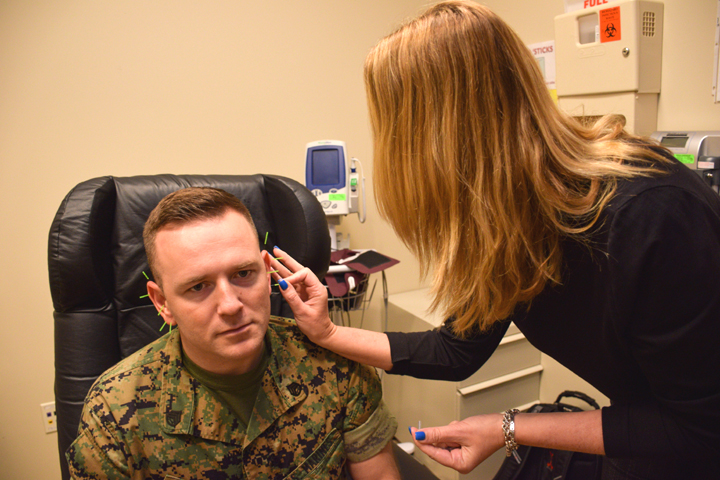
It's complicated: Our relationship with social media

An Army health care provider loads the T2 Mood Tracker mobile app on a mobile device for a demonstration for his patients. (DoD photo)
For many, the post-holiday season is a challenging, emotional time. Scrolling through social media posts about the perfect gift or holiday celebration may intensify negative feelings, especially for those struggling with depression, loss, or loneliness.
Impact of Social Media on our Mental Health
It’s true that social media can help connect and reconnect people; however, it may increase feelings of isolation or remind people of what they don’t have.
Because all seems merry and bright on social media, we may be tempted to compare ourselves (unfavorably) with those we perceive have more accomplishments, make more money, have nicer belongings, or boast more social media followers. When you find yourself envious of others, and feel jealous or inferior, you are most likely experiencing a negative social comparison.
Social Media Pros and Cons
Researchers discovered that social networking sites such as Facebook have psychological benefits like connection, communication, and a sense of belonging. However, several studies indicate that prolonged use of the internet might be associated with signs and symptoms of depression and low self-esteem and loneliness.
So, what’s a poor social media user to do? There are ways to navigate tricky post-holiday times. The key is awareness.
Limit Social Media Influence on Mood
As mentioned earlier, there are circumstances when social media can help with the blues. However, for those who are vulnerable to negative social comparison, they should take steps to protect themselves. Here are a few recommendations:
- Notice when exposure to others’ happiness brings you down. Use the free T2 Mood Tracker mobile app (Android, iOS) to see if your moods change with certain activities (such as using social media).
- Limit social media use if you see that it affects your mood. Take a break — you’ll have plenty of time to catch up.
- Talk with a trusted friend about your feelings. Reality checks with peers about their experiences over the holidays can also help; it’s likely that others had similar challenges.
- Manage stress by getting enough sleep and exercise. Also, watch what you eat and how much you drink — a bad diet and too much alcohol can negatively affect your mood.
- Manage your expectations. During the holidays, you saw lots of advertising and other media that implied all holiday moments should be glorious and beautiful. Remind yourself that these ads are elaborate productions and often don’t reflect reality. It’s OK if your events didn’t mimic them.
- Plan a pleasant activity that is do-able. Walk on a trail, take a bubble bath or visit with a friend. After you return to social media, you may decide to post photos from your activity. If you need suggestions, try the free Positive Activity Jackpot mobile app for Android.
Study's focus: Mending hearts broken by deaths of military loved ones
Article
2/19/2019

Military tests virtual programs for adapting to grief
Technology Solutions for Psychological Health
Congressional Testimony
2/1/2019
HR 3219, HAC Report FY 2018, 115-219, Pg. 287-288
Traumatic Brain Injury/Psychological Health
Congressional Testimony
1/25/2019
S. 3000, SAC Report for FY 2017, 114-263, Pg. 193
Three ways to help patients achieve New Year’s resolutions
Article
1/25/2019

Motivation ebbs and flows according to our moods and energy levels
Help Military Clients Transitioning to Civilian Life
Publication
12/11/2018
An article to provide reference and resources for service members in the process of or transitioned out of active duty service.
A pain in the brain may be a migraine
Article
11/15/2018

Women affected three times more frequently than men
DHA IPM 18-019: Guidance for Service Implementation of Separation Mental Health Assessments
Policy
This Defense Health Agency-Interim Procedures Memorandum (DHA-IPM), based on the authority of References (a) through (c), and in accordance with the guidance of References (d) through (g): • Assigns responsibilities and provides instructions for implementing Reference (d), which requires an MHA for Service members prior to separation in accordance with References (e) through (g). • Is effective immediately; it will be incorporated into DHA-Procedural Instruction xxxx.xx, “Separation History and Physical Examination.” This DHA-IPM will expire effective 12 months from the date of issue.
- Identification #: 18-019
- Date: 11/8/2018
- Type: DHA Interim Procedures Memorandum
- Topics: Mental Health Care | Assessments
Women and depression
Article
10/30/2018

1 in every 8 women develops clinical depression during her lifetime
Pilot Program on Investigational Treatment of Members of the Armed Forces for TBI and PTSD
Congressional Testimony
10/9/2018
HR 3304, NDAA for FY 2014, Sec. 704
What to Expect at Your First Appointment
Video
9/20/2018

You’ve reached out for help, you’ve found the right provider, now Kristin Gwin from Walter Reed National Military Medical Center shares what to expect at your first appointment.
Kristin Gwin, Walter Reed Social Worker Talks About Getting Help
Video
9/12/2018

Kristin Gwin, a Social Worker at Walter Reed National Military Medical Center understands that getting help can be an intimidating process. She offers advice on how to get started by letting a professional know you want help.
How sharing my PTSD struggles helped others—and me
Article
9/4/2018

Army Sgt. Jon Harman 82nd Airborne Division, liaison officer at Walter Reed Military Medical Center
DHA PI 6490.01: BH Treatment and Outcomes Monitoring
Policy
This Defense Health Agency-Procedural Instruction (DHA-PI), based on the authority of References (a) and (b), and in accordance with the guidance of References (c) through (k): a. Establishes the Defense Health Agency’s (DHA) procedures for the collection and analysis of BH outcome data. b. Addresses how DoD will standardize BH outcome data collection to: assess variations in mental health and substance use care among in-garrison medical treatment facilities (MTFs) and clinics; assess the relationship of treatment protocols and practices to BH outcomes; and identify barriers to provider implementation of evidence-based clinical guidance approved by DoD. c. Designates the Army as the DoD lead Service for maintenance and sustainment of the Behavioral Health Data Portal (BHDP) in specialty care mental health and substance use clinics, referred to collectively as BH clinics, until BHDP functionality can be integrated with GENESIS or another electronic health record (EHR) system managed by DHA. d. Designates DHA Information Operations (J-6) as lead on transitioning BHDP functional requirements related to outcomes monitoring to future EHR data collection platforms and processes.
- Identification #: DHA PI 6490.01
- Date: 7/12/2018
- Type: DHA Procedural Instruction
- Topics: Mental Health Care | Substance Abuse
There is hope
Article
7/12/2018

More than 350,000 deaths are attributed to opioid overdoses nationwide since 1999
Breaking down anxiety one fear at a time
Article
6/5/2018

Generalized anxiety, panic disorder, and anxiety related to PTSD are common disorders. In fact, an estimated 31 percent of U.S. adults experience anxiety at some point in their lives; one marine discusses his journey.





















.png)












No hay comentarios:
Publicar un comentario